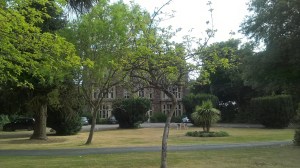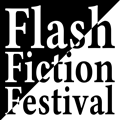 At this year’s festival in July at Trinity College, Bristol we raised money for Comic Relief to support the money raised by Funny Bone, the anthology of funny flash fiction published by Peter Blair and Ashley Chantler at Chester University. We raised £250 which was a great outcome. Read in Full
At this year’s festival in July at Trinity College, Bristol we raised money for Comic Relief to support the money raised by Funny Bone, the anthology of funny flash fiction published by Peter Blair and Ashley Chantler at Chester University. We raised £250 which was a great outcome. Read in Full
Flash Fiction Festival 2018
 We were thrilled with the success of the Flash Fiction Festival, this year entirely funded by Bath Flash Fiction Award, and directed by Jude Higgins with the help of a great festival team.The festival took place at Trinity College, Bristol 20th-22nd July. Everything was brilliant, including the weather. The full programme of events began with readings on Friday evening and continued with workshop, talks, book launches and general fun with very popular impromptu festival karaoke organised by Helen Rye and Christopher Allen.
We were thrilled with the success of the Flash Fiction Festival, this year entirely funded by Bath Flash Fiction Award, and directed by Jude Higgins with the help of a great festival team.The festival took place at Trinity College, Bristol 20th-22nd July. Everything was brilliant, including the weather. The full programme of events began with readings on Friday evening and continued with workshop, talks, book launches and general fun with very popular impromptu festival karaoke organised by Helen Rye and Christopher Allen.
- Participants and workshop leaders travelled from many different parts of the world to come to the festival.
 Here’s Roberta Beary, who came from Ireland, with our festival curator, Meg Pokrass.
Here’s Roberta Beary, who came from Ireland, with our festival curator, Meg Pokrass.A Letter from Laurie Stone
Dear Flashers,
I am looking forward to seeing you in Bristol this July and  learning about your writing. I will be hosting a workshop on hybrid narrative and crafting sentences that work at the level of separate stories. Festival director Jude Higgins has asked some of us to post ideas ahead of our rendezvous. Read in Full
learning about your writing. I will be hosting a workshop on hybrid narrative and crafting sentences that work at the level of separate stories. Festival director Jude Higgins has asked some of us to post ideas ahead of our rendezvous. Read in Full

Sculpting Flash Fiction with Nancy Stohlman
I’m so excited to be part of the second annual Flash Fiction Festival!
I’m going to be teaching two classes that both come primarily out of my 15 years as an editor. The Sculpting Flash Fiction class is my love letter to the art of editing—for me this is where the real magic happens. My own first drafts are fast and uncensored, but the sculpting of those ideas is the real dance and my favorite part. I hope to not only give some concrete tools for editing flash fiction but also to inspire an appreciate for this part of the process, which I fondly call the “puberty” of our work, where everything changes and starts to find itself.
Read in Full

A Week In The Borgo
Robert Barrett
Last year, at the Flash Fiction Festival, I was the lucky winner of a weeks writing retreat in Italy, courtesy of Charmaine Wilkerson. (I’ll let you all in on a little secret, Charmaine is just as charming and generous as you thought she was, only more so).
Read in Full

Flash Fiction and the Loss of Ego
John Brantingham
In late Spring in the High Sierra where I live in the summer, the snow melts off and turns the mountains into a world of mud. In those places of recent fires, this is the season for morel mushrooms, which love the nutrient rich ash. I have a ranger friend who hunts them through the soggy mud, and she cooks them on a portable stove right there in the dark shade of the giant sequoia trees. Fire is an important part of the pulse of the forest. Without it, the giant sequoias would not reseed. Without it, new growth would never have enough light to thrive.
Read in Full
Flashing Historically – Nuala O’Connor
 I’m an Irish novelist, short story writer and flash writer. At the Flash Fiction Festival I’ll be facilitating a workshop on Historical Flash Fiction. The last two novels I’ve written have been set in the nineteenth century, and my novel-in-progress is Edwardian, so for a few years I’ve been steeped in the language, social history, fashion, mores and environment of those times. I love research and, in the throes of it, often come across snippets that can’t be used in the novels, but that I know might work as flash. So, more and more, I’m writing historical flash as well as historical novels, though I’m always pleased, too, when an idea for a contemporary flash hoves into view.
I’m an Irish novelist, short story writer and flash writer. At the Flash Fiction Festival I’ll be facilitating a workshop on Historical Flash Fiction. The last two novels I’ve written have been set in the nineteenth century, and my novel-in-progress is Edwardian, so for a few years I’ve been steeped in the language, social history, fashion, mores and environment of those times. I love research and, in the throes of it, often come across snippets that can’t be used in the novels, but that I know might work as flash. So, more and more, I’m writing historical flash as well as historical novels, though I’m always pleased, too, when an idea for a contemporary flash hoves into view.
Read in Full

Festival Support for the Cash-Strapped Writer
Review of Flash Fiction Festival One
Al Kratz
 The 2017 anthology Flash Fiction Festival, One published by Ad Hoc Fiction is power packed into a tiny package. These seventy-four works of micro-fiction, all under 250 words, showcase the work of a vital community made up of publishers, readers, writers, and lovers of flash fiction. The work comes from or was inspired by lectures and prompts discussed at the first literary festival entirely dedicated to flash fiction held in Bath last June.
The 2017 anthology Flash Fiction Festival, One published by Ad Hoc Fiction is power packed into a tiny package. These seventy-four works of micro-fiction, all under 250 words, showcase the work of a vital community made up of publishers, readers, writers, and lovers of flash fiction. The work comes from or was inspired by lectures and prompts discussed at the first literary festival entirely dedicated to flash fiction held in Bath last June.
Just like flash fiction at work, where much of the story is set in the implied, the anthology is an iceberg of what happened at the festival. The whole is greater than the sum of its parts. The life of those stories goes beyond their words and also suggests the thriving energy present at the festival, the communion, the growth.
Read in Full
Help for low-income writers – in 1,000 words or less
K. M. Elkes

Ken reading at the launch of Flash Fiction Festival One.
In the run-up to the festival I’m trying to get media coverage of the event (so if you’re reading this and maybe have a show on Radio 4 or write a literary column for the Guardian, then feel free to get in touch!).
During the Festival I will be popping up as Editor of The A3 Review – a short poetry and prose magazine that folds like a map – which I co-edit alongside Writing Maps publishers Shaun Levin. We’re aiming to provide all festival-goers with a selection of back issues absolutely free.
Read in Full

You must be logged in to post a comment.